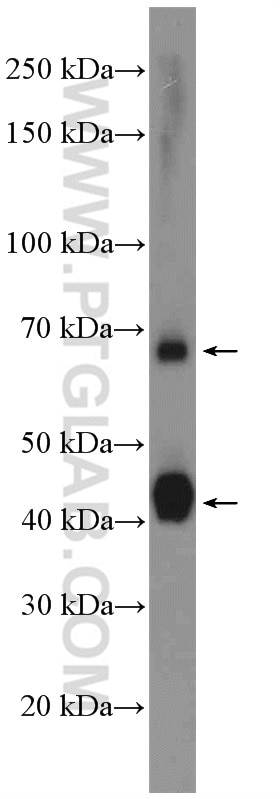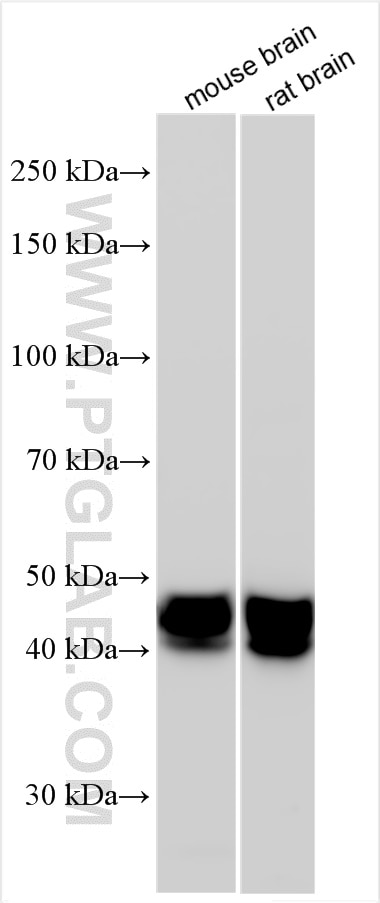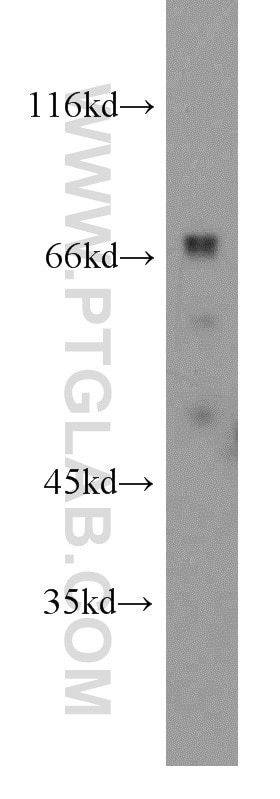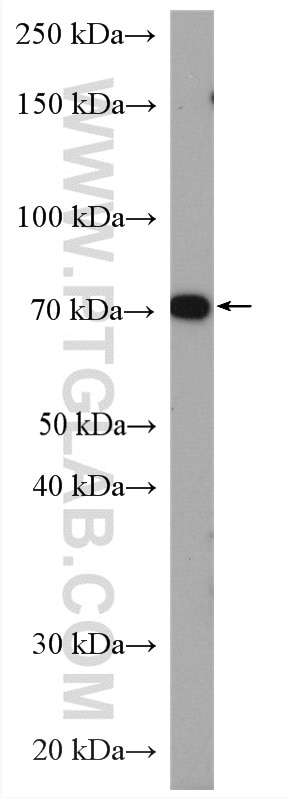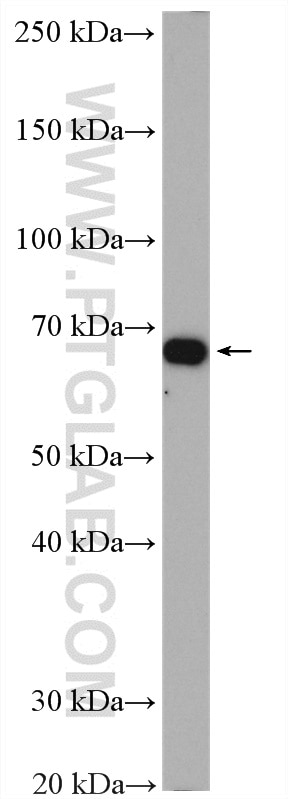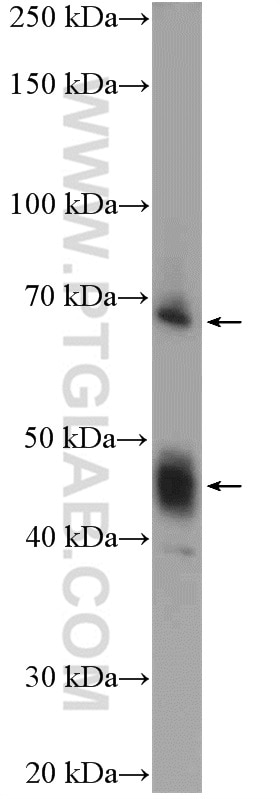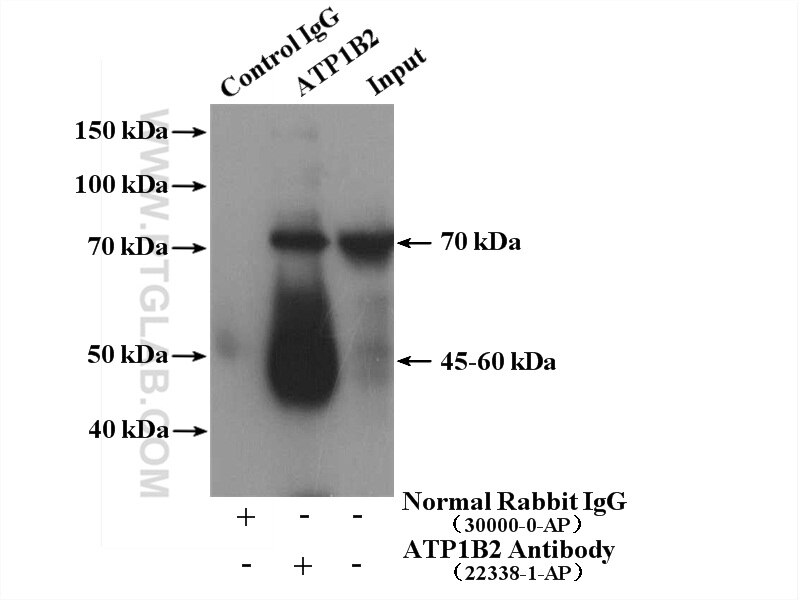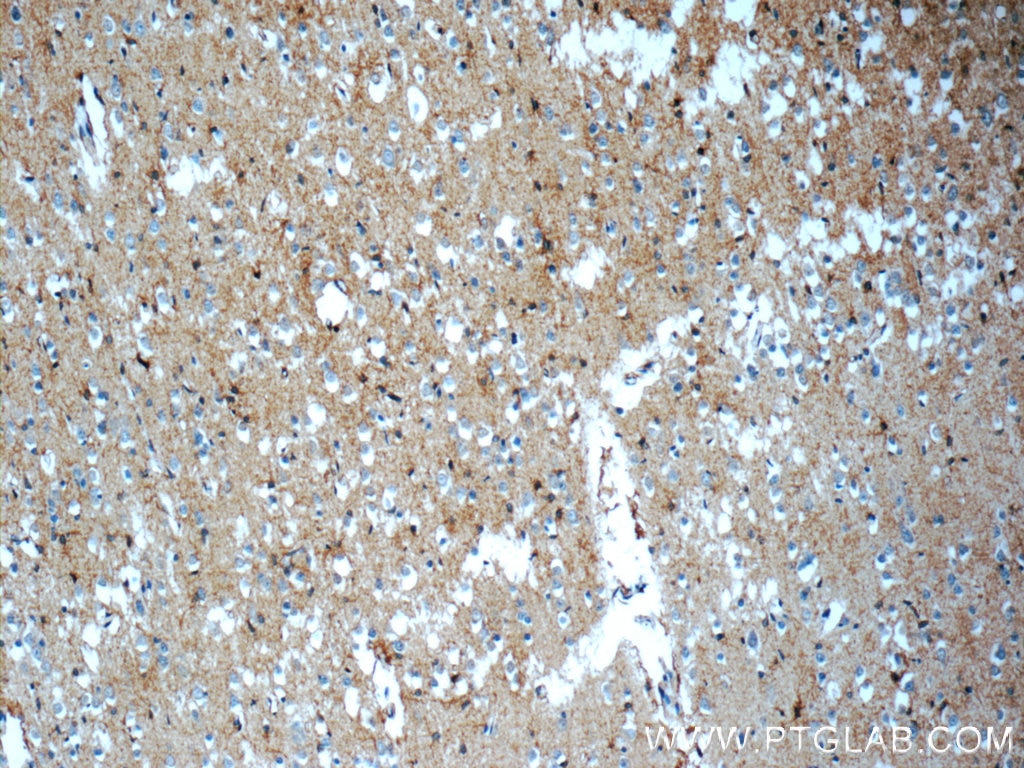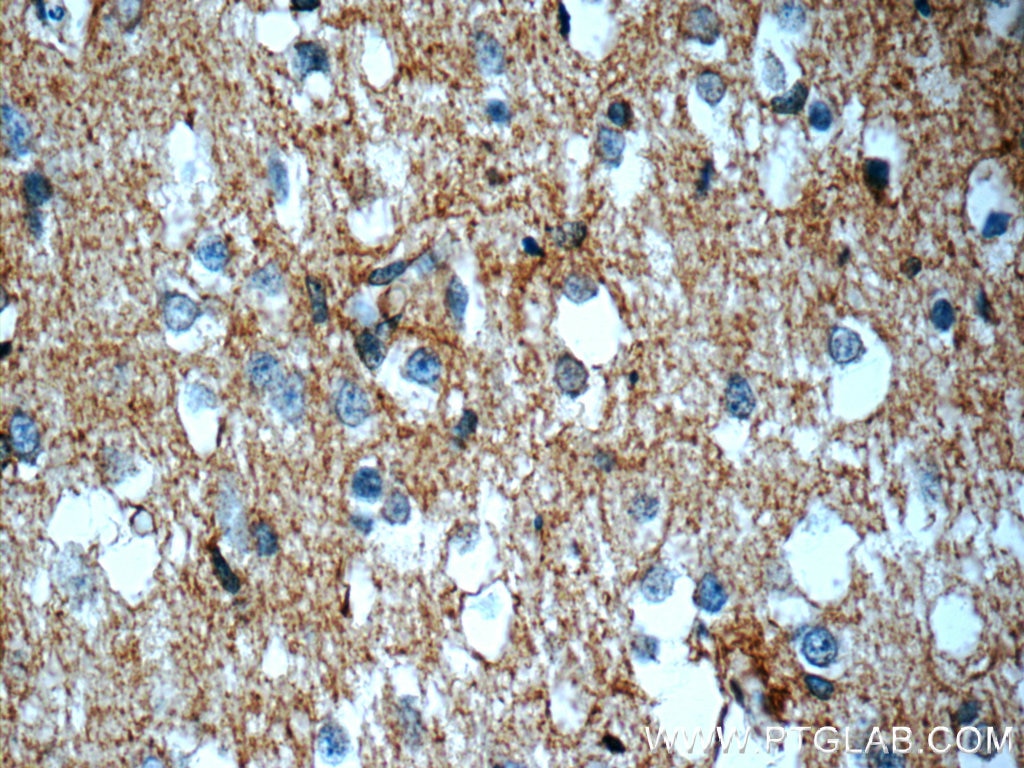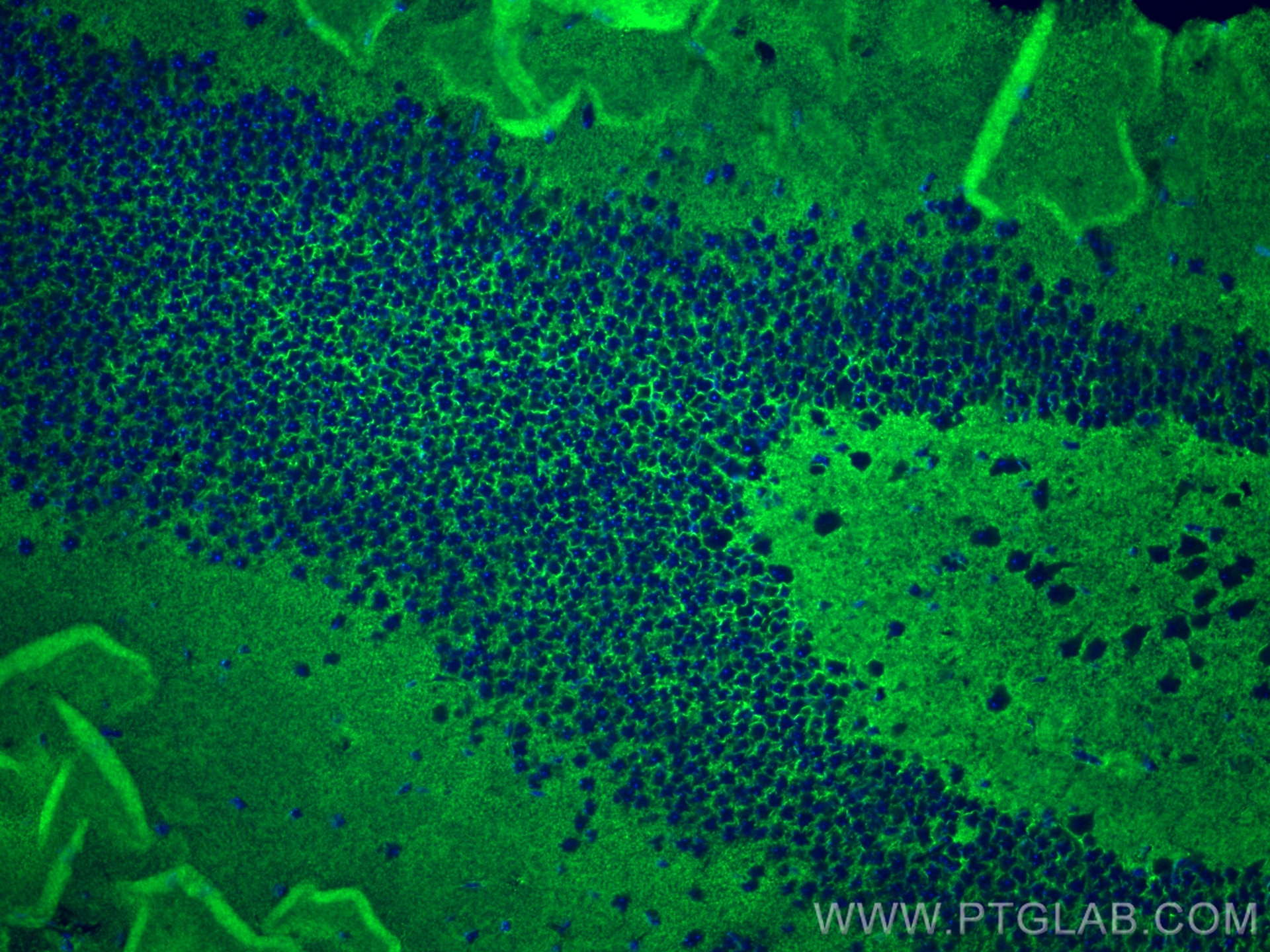ATP1B2 Polyklonaler Antikörper
ATP1B2 Polyklonal Antikörper für WB, IHC, IF-P, IP, ELISA
Wirt / Isotyp
Kaninchen / IgG
Getestete Reaktivität
human, Maus, Ratte
Anwendung
WB, IHC, IF-P, IP, ELISA
Konjugation
Unkonjugiert
Kat-Nr. : 22338-1-AP
Synonyme
Geprüfte Anwendungen
| Erfolgreiche Detektion in WB | Maushirngewebe, C2C12-Zellen, C6-Zellen, Maus-Skelettmuskelgewebe |
| Erfolgreiche IP | Maus-Skelettmuskelgewebe |
| Erfolgreiche Detektion in IHC | humanes Hirngewebe Hinweis: Antigendemaskierung mit TE-Puffer pH 9,0 empfohlen. (*) Wahlweise kann die Antigendemaskierung auch mit Citratpuffer pH 6,0 erfolgen. |
| Erfolgreiche Detektion in IF-P | Maushirngewebe |
Empfohlene Verdünnung
| Anwendung | Verdünnung |
|---|---|
| Western Blot (WB) | WB : 1:5000-1:50000 |
| Immunpräzipitation (IP) | IP : 0.5-4.0 ug for 1.0-3.0 mg of total protein lysate |
| Immunhistochemie (IHC) | IHC : 1:20-1:200 |
| Immunfluoreszenz (IF)-P | IF-P : 1:50-1:500 |
| It is recommended that this reagent should be titrated in each testing system to obtain optimal results. | |
| Sample-dependent, check data in validation data gallery | |
Veröffentlichte Anwendungen
| WB | See 10 publications below |
| IF | See 2 publications below |
Produktinformation
22338-1-AP bindet in WB, IHC, IF-P, IP, ELISA ATP1B2 und zeigt Reaktivität mit human, Maus, Ratten
| Getestete Reaktivität | human, Maus, Ratte |
| In Publikationen genannte Reaktivität | human, Maus, Ratte |
| Wirt / Isotyp | Kaninchen / IgG |
| Klonalität | Polyklonal |
| Typ | Antikörper |
| Immunogen | ATP1B2 fusion protein Ag17818 |
| Vollständiger Name | ATPase, Na+/K+ transporting, beta 2 polypeptide |
| Berechnetes Molekulargewicht | 290 aa, 33 kDa |
| Beobachtetes Molekulargewicht | 45-65 kDa |
| GenBank-Zugangsnummer | BC126175 |
| Gene symbol | ATP1B2 |
| Gene ID (NCBI) | 482 |
| Konjugation | Unkonjugiert |
| Form | Liquid |
| Reinigungsmethode | Antigen-Affinitätsreinigung |
| Lagerungspuffer | PBS with 0.02% sodium azide and 50% glycerol |
| Lagerungsbedingungen | Bei -20°C lagern. Nach dem Versand ein Jahr lang stabil Aliquotieren ist bei -20oC Lagerung nicht notwendig. 20ul Größen enthalten 0,1% BSA. |
Hintergrundinformationen
ATP1B2 is the β2 subunit of Na+/K+-ATPase which is an essential membrane-bound enzyme responsible for the transport of Na+ and K+ in most eukaryotic cells. ATP1B2 is also called the adhesion molecule on glia (AMOG) and it is highly expressed in normal glia. It is a heavily glycosylated protein that plays a role in cellular adhesion in the CNS. Recently differential expression of ATP1B2 has been found in some glioneuronal tumors (PMID: 23887941, 19371356). This antibody recognizes the endogenous ATP1B2 protein in human brain. The bands between 45 kDa and 65 kDa represent the glycosylated forms of ATP1B2 in different levels (PMID: 8918259).
Protokolle
| PRODUKTSPEZIFISCHE PROTOKOLLE | |
|---|---|
| WB protocol for ATP1B2 antibody 22338-1-AP | Protokoll herunterladen |
| IHC protocol for ATP1B2 antibody 22338-1-AP | Protokoll herunterladenl |
| IF protocol for ATP1B2 antibody 22338-1-AP | Protokoll herunterladen |
| IP protocol for ATP1B2 antibody 22338-1-AP | Protokoll herunterladen |
| STANDARD-PROTOKOLLE | |
|---|---|
| Klicken Sie hier, um unsere Standardprotokolle anzuzeigen |
Publikationen
| Species | Application | Title |
|---|---|---|
Cell Mol Gastroenterol Hepatol Self-renewing Monolayer of Primary Colonic or Rectal Epithelial Cells. | ||
Redox Biol Caveolin 1-related autophagy initiated by aldosterone-induced oxidation promotes liver sinusoidal endothelial cells defenestration. | ||
Cancer Cell Int Spider venom components decrease glioblastoma cell migration and invasion through RhoA-ROCK and Na+/K+-ATPase β2: potential molecular entities to treat invasive brain cancer. | ||
World J Biol Psychiatry Altered expression levels of miR-144-3p and ATP1B2 are associated with schizophrenia. | ||
Eur J Appl Physiol Resistance training upregulates skeletal muscle Na+, K+-ATPase content, with elevations in both α1 and α2, but not β isoforms. | ||
Neurosci Lett Effects of icariin on alleviating schizophrenia-like symptoms by regulating the miR-144-3p/ATP1B2/mTOR signalling pathway |
